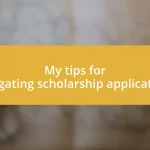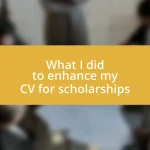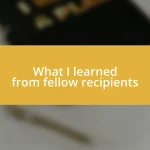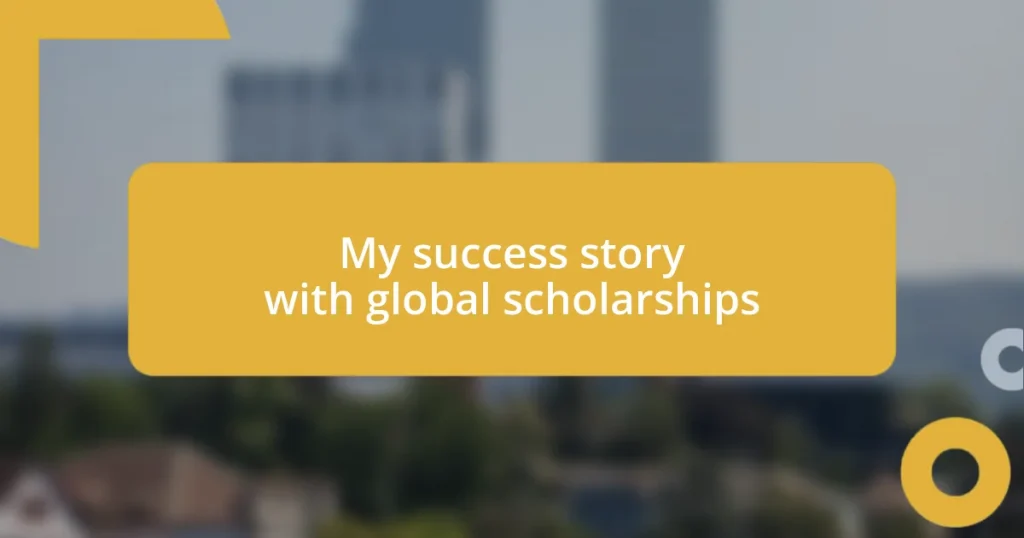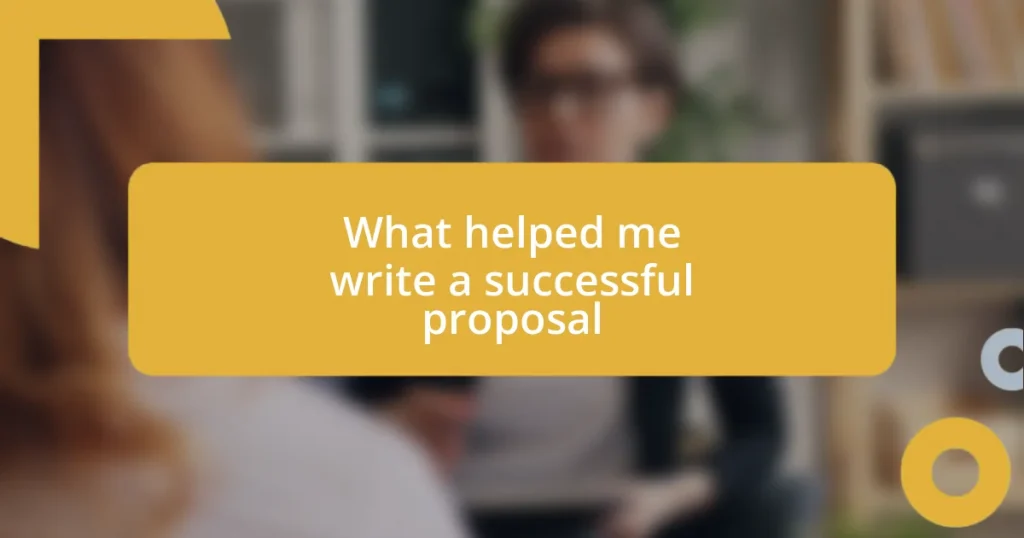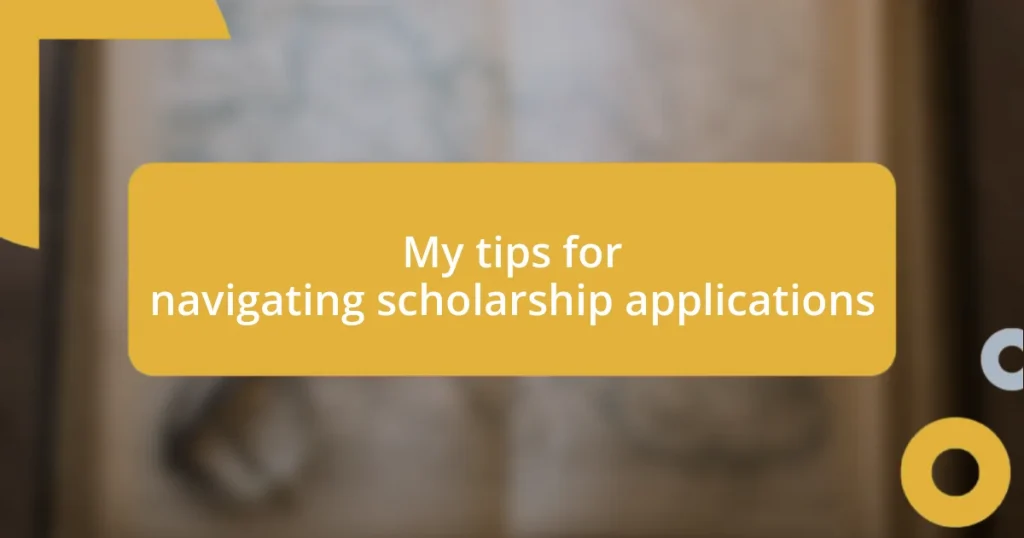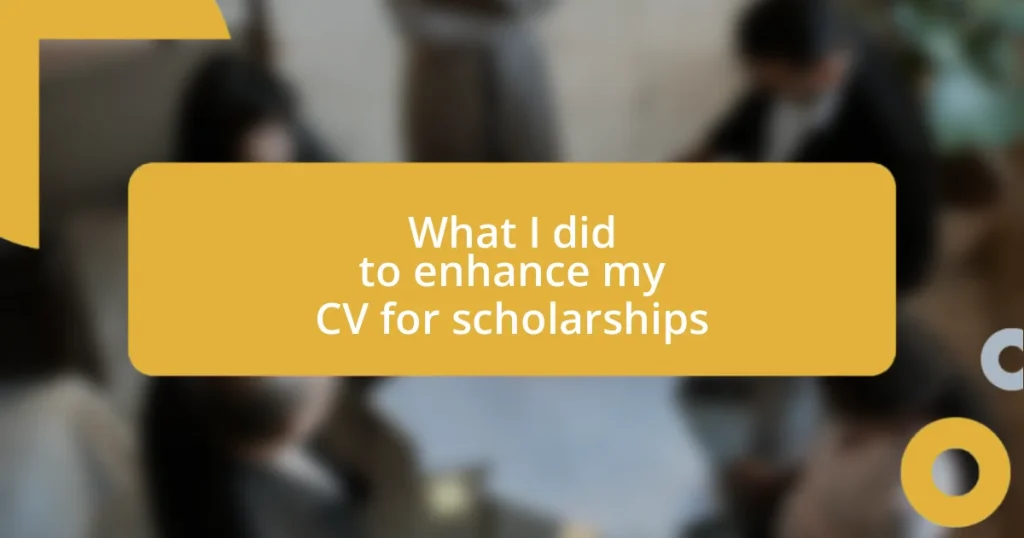Key takeaways:
- Identifying the right scholarships involves understanding personal values and crafting a narrative that resonates with scholarship committees.
- Preparing a strong application requires tailoring narratives, highlighting achievements, and seeking feedback, while showcasing one’s commitment and authenticity.
- Maximizing the scholarship experience includes actively engaging with the scholarship community, seeking mentorship, and approaching experiences with an open mind for personal growth.
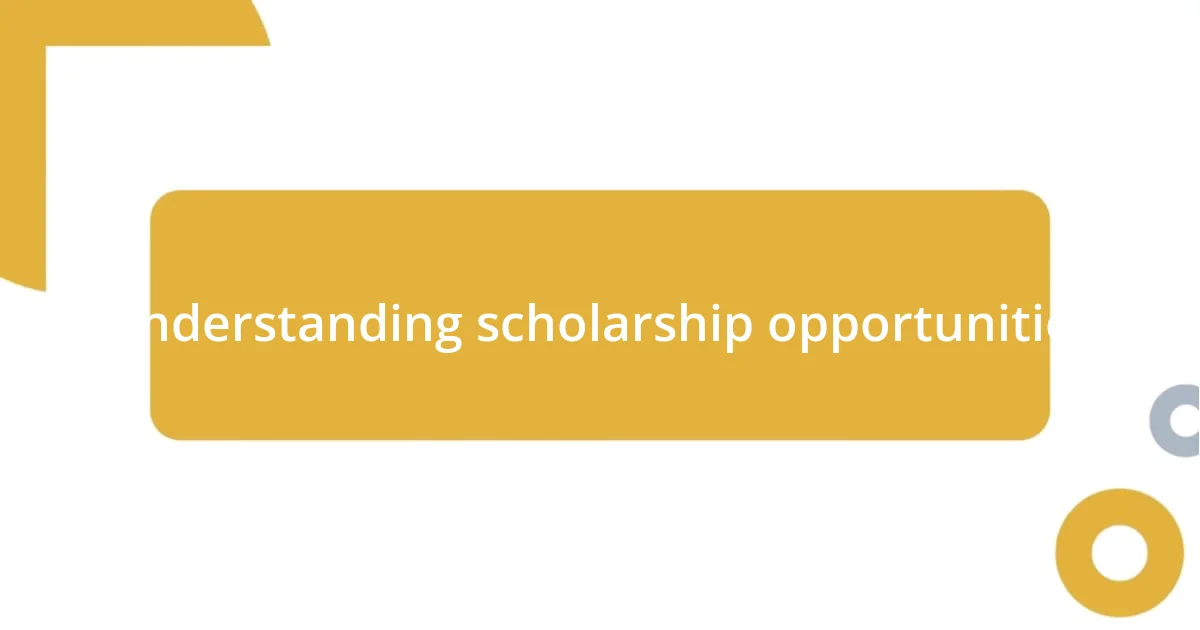
Understanding scholarship opportunities
Scholarship opportunities can feel overwhelming at first, especially when you realize there are countless options available. I remember sifting through endless lists of scholarships, trying to pinpoint the ones that truly aligned with my goals. It made me wonder—how can one stand out in a sea of applicants?
When I finally narrowed down my search, I discovered that many scholarships weren’t just about grades; they valued community service, personal stories, and unique experiences. For instance, I came across one that focused on environmental initiatives. This not only matched my passion for sustainability but also encouraged me to reflect on my own journey—how I had organized local clean-up events during my high school years. Realizing this connection was empowering!
Moreover, understanding the requirements and application processes for different scholarships is crucial. I distinctly recall the anxiety of preparing my essays. It dawned on me that your personal narrative is often your biggest asset. How can you weave your experiences into a compelling story that resonates with scholarship committees? In my experience, sharing both my challenges and triumphs helped create a genuine connection that made my application memorable.
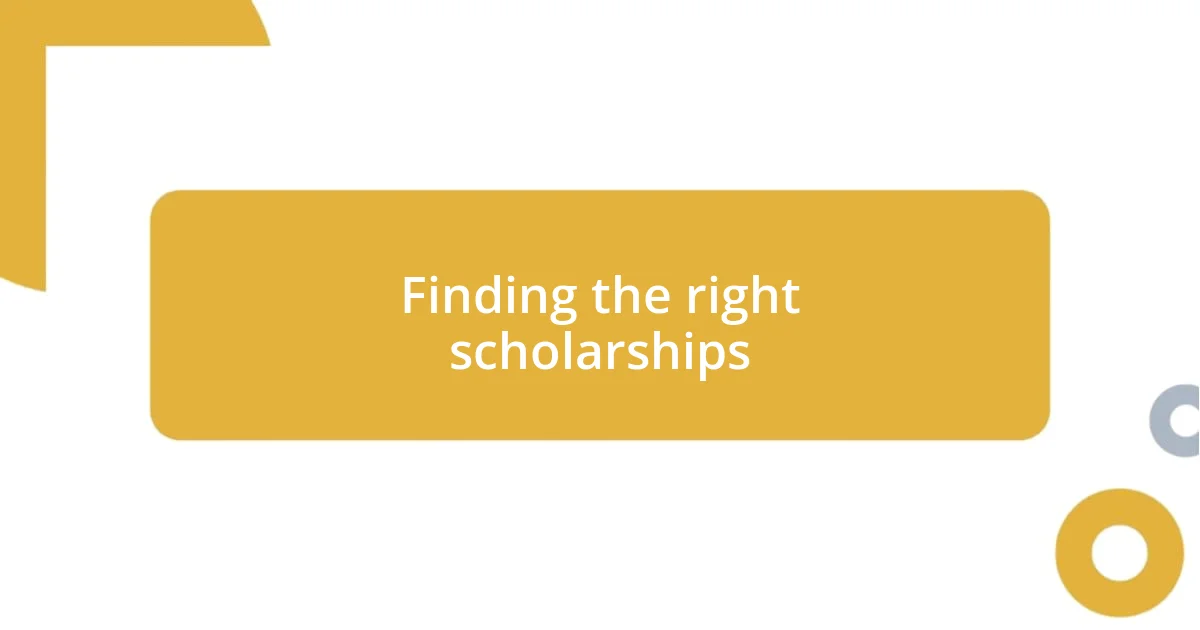
Finding the right scholarships
Finding scholarships that truly fit your aspirations is both an art and a science. I remember the moment I realized that not all scholarships were created equal; some seemed like they were designed for students who matched a specific mold. This prompted me to reevaluate my qualifications and interests, allowing me to seek out scholarships that felt authentic and relevant to my experiences.
Diving deeper into my research, I found online platforms dedicated to matching students with scholarships based on their profiles. I used one such platform, and it was like shining a flashlight in a dark room—I could see opportunities I never would have found on my own. Each completed profile felt like taking a step closer to discovering pathways that resonated with my values and ambitions.
As I sifted through potential options, I made a list of scholarships that excited me. I quickly learned that prioritizing my applications was essential. I focused on those that not only aligned with my achievements but also connected with my personality. I found it invaluable to approach each application as a chance to reflect on my journey. The first few rounds of applying were challenging, but eventually, it became clear that the right scholarships made all the difference.
| Scholarship Type | Key Focus |
|---|---|
| Merit-Based | Academic excellence or achievements |
| Need-Based | Financial assistance for low-income students |
| Community Service | Involvement in local initiatives or volunteer work |
| Field-Specific | Scholarships dedicated to specific majors or career paths |
| Diversity Scholarships | Support for underrepresented groups in education |
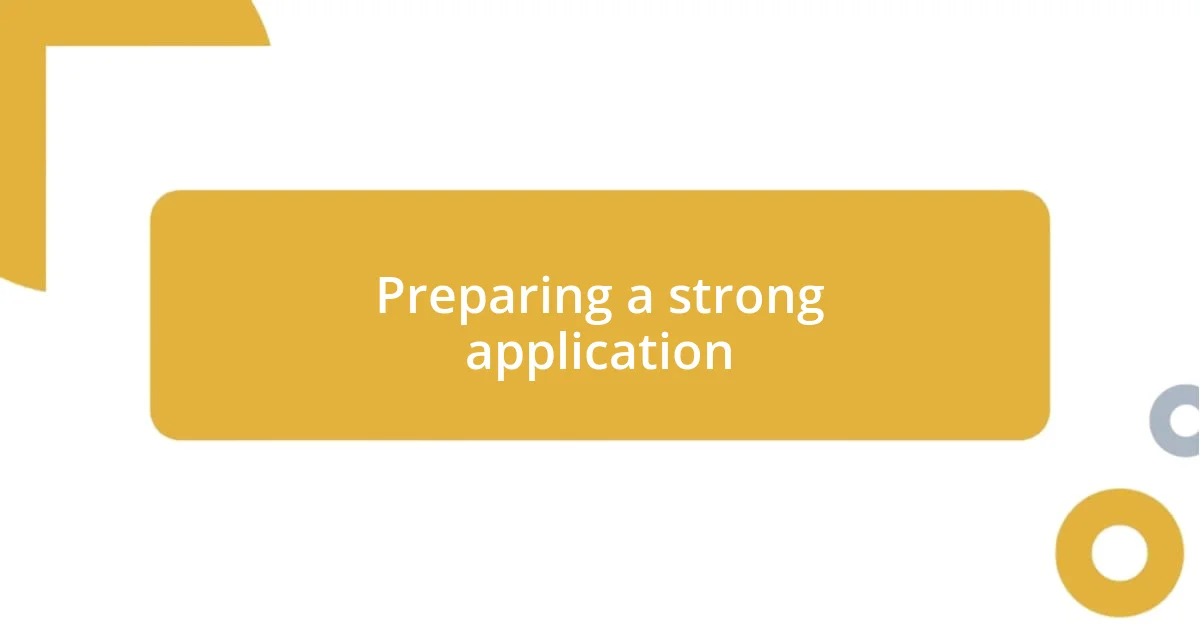
Preparing a strong application
Preparing a strong application is all about showcasing who you truly are. When I crafted my application, I remember spending hours reflecting on my experiences and how they shaped my identity. It wasn’t just about listing accolades; it was about weaving them into a narrative that illustrated my journey. I made sure every element, from my essay to the recommendation letters, aligned with my core message, emphasizing my passion for learning and growth.
To enhance your application, consider these essential tips:
– Tailor your narrative: Customize your essays and materials to reflect the values of each scholarship.
– Highlight achievements: Choose specific accomplishments that showcase your strengths and align with the scholarship’s focus.
– Connect emotionally: Share personal stories that resonate emotionally, making your application more relatable.
– Seek constructive feedback: Have mentors or peers review your application to provide insights on clarity and impact.
– Show your commitment: Illustrate your dedication to your chosen field or cause through relevant experiences and future plans.
By focusing on these aspects, I found that my application began to come to life, becoming not just a formality, but a true representation of my ambitions and values.
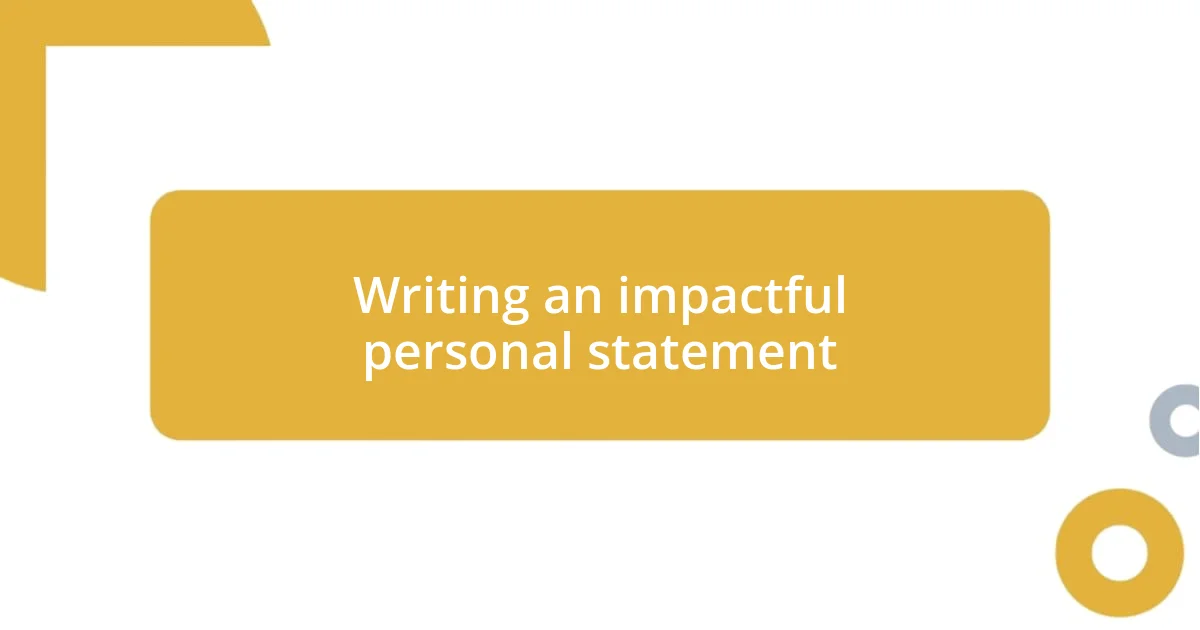
Writing an impactful personal statement
When it comes to writing an impactful personal statement, I think about it as telling my story, not just listing accomplishments. I recall one late night where I reflected on my passion for environmental science—I let the memories of volunteering at local clean-up events spill onto the page. That emotional connection transformed my statement from a mere description of achievements into a vibrant narrative that spoke to why I truly cared about my field.
A key element I discovered was the power of authenticity. I made it a point to share a moment when I faced a challenge in my studies that changed my perspective. Instead of skimming over it, I delved into how that experience fueled my resolve and desire to make a difference. This wasn’t just about impressing the scholarship committee; it was about creating a genuine connection through shared values and experiences.
I often ask myself: What makes my journey unique? This question guided my writing process. By reflecting on my cultural background and the trials I faced, I painted a picture that stood out. Crafting my personal statement wasn’t just an application task; it was an opportunity for self-discovery—it gave me a clearer vision of my goals. In the end, I learned that an impactful personal statement isn’t just about the content; it’s about capturing your identity and aspirations in a way that truly resonates.
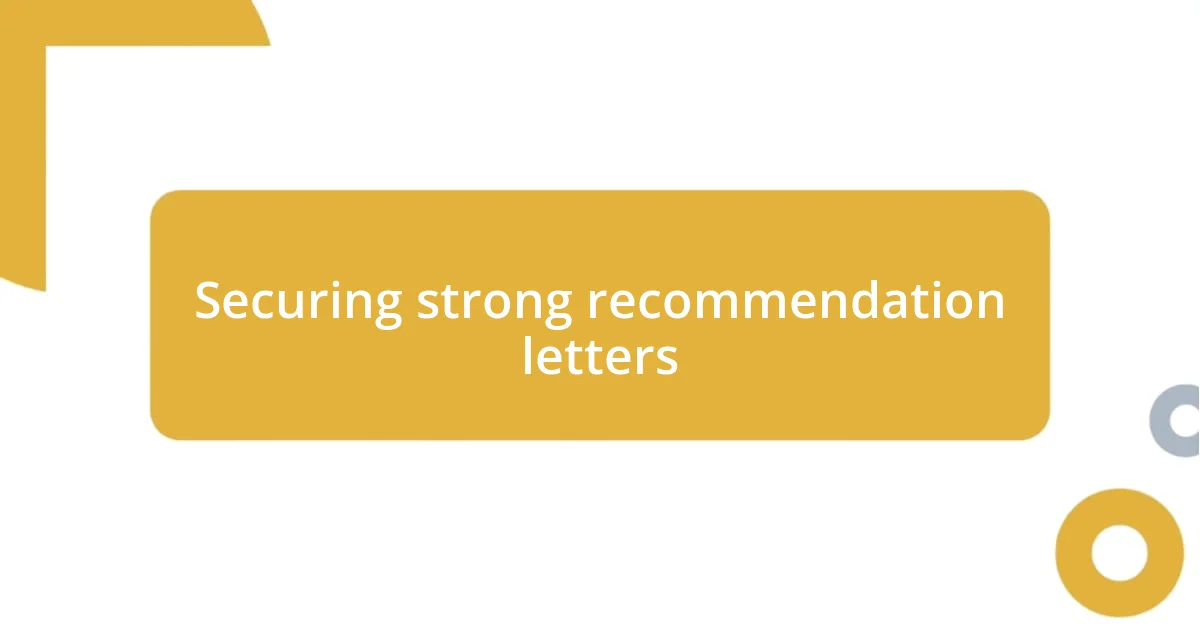
Securing strong recommendation letters
One of the most impactful decisions I made early on was choosing the right people to write my recommendation letters. I approached professors and supervisors who were familiar with my journey—not just my grades, but also my growth and aspirations. Their understanding of my character led to letters that were not only glowing but also personalized, highlighting experiences we had shared that shaped my goals.
I remember feeling a mix of excitement and anxiety as I prepared to ask for these letters. It wasn’t just about asking; I found that sharing my scholarship dreams with them invited a deeper connection. I would often tell them how much their mentorship meant to me and how their support inspired both my academic and personal development. This helped them write letters that reflected my enthusiasm and dedication, making the possibility of backing me even more compelling.
For me, the key takeaway was to do my homework on who I chose to ask. Not every mentor or employer is equipped to write a strong letter. I always sought individuals who could speak from an authentic place about our shared experiences, and it paid off significantly. In the end, those letters were not just endorsements; they were powerful narratives that intertwined our stories, making my application stand out.
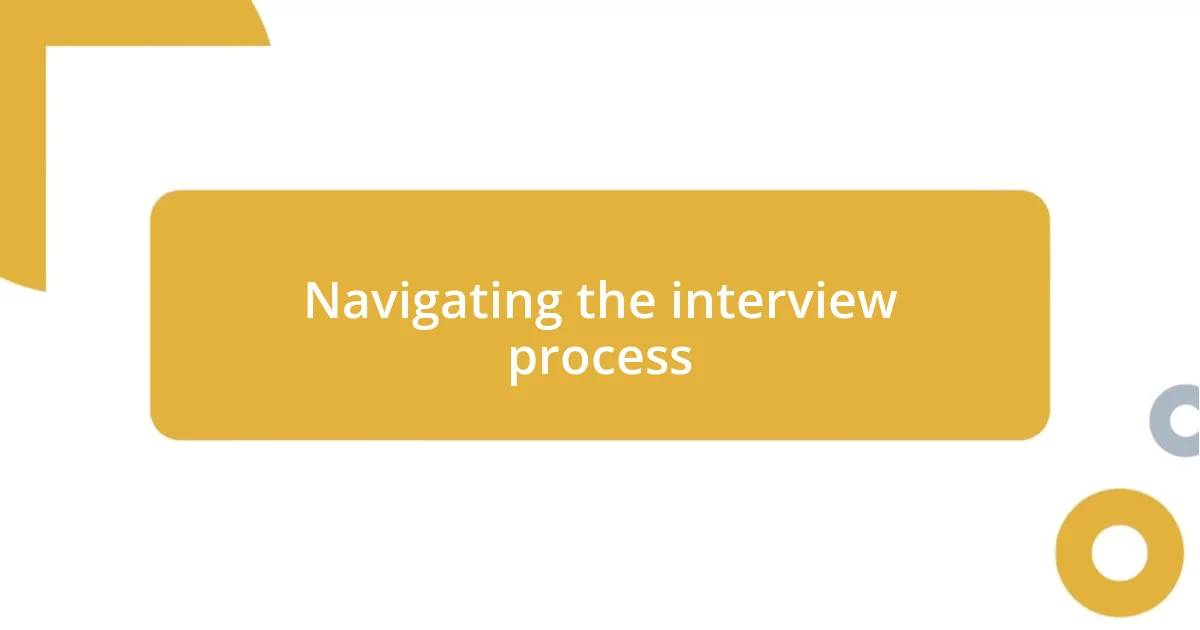
Navigating the interview process
Navigating the interview process can feel like stepping into uncharted waters, but I’ve learned that preparation is key. I still remember my first interview for a global scholarship. My heart raced as I sat across from the panel, but I found that clear communication and confidence made all the difference. I focused on articulating my passion for my field while keeping the conversation dynamic, which helped ease my nerves.
One thing I realized is the importance of practicing common interview questions. I made it a habit to rehearse with a friend who had a knack for giving constructive feedback. It was during one of these mock sessions that I discovered the value of storytelling in my answers. For instance, when asked about challenges, I shared a specific incident where I had to lead a team project despite initial setbacks. That anecdote not only showcased my resilience but also sparked a genuine dialogue with the interviewers, making the experience feel more like a collaborative conversation.
As the interview wrapped up, I always made sure to ask questions of my own. This not only demonstrated my interest in the program but also created an opportunity for me to connect more personally with the interviewers. I vividly recall asking about their experiences with the scholarship program; their enthusiastic responses reminded me that I could be part of a community that shares my passion. This interaction transformed the intimidating interview into a meaningful exchange, reinforcing my belief that these moments can be both enlightening and rewarding.
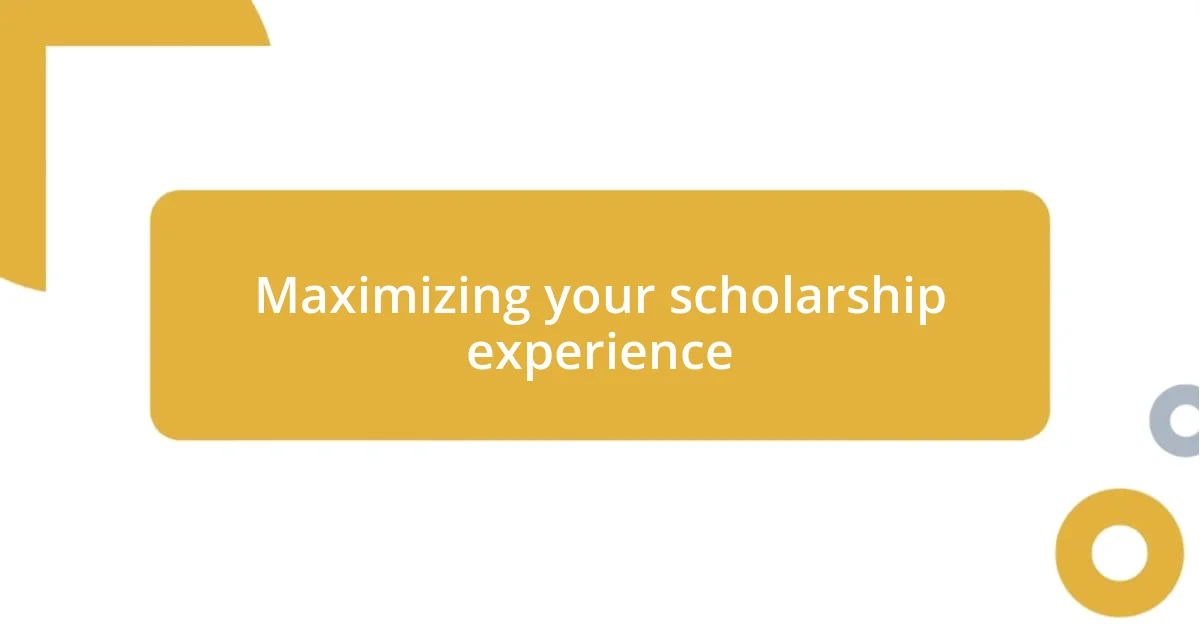
Maximizing your scholarship experience
Maximizing your scholarship experience is crucial for making the most of the opportunities offered. One strategy that really made a difference for me was actively engaging with the scholarship community. I made it a point to attend every orientation and networking event available. It was during one of these meet-ups that I met a fellow scholar who later became a close friend and collaborator on multiple projects. I learned that these connections can not only provide support but also lead to exciting opportunities you may not have considered.
Another aspect I found essential was actively seeking mentorship. I vividly recall reaching out to a past scholarship recipient whose work in my field I admired. Her willingness to share her journey with me was not only inspiring; it also opened my eyes to the nuances of navigating scholarship life. Those conversations helped me refine my goals and approach, making me realize the immense value of learning from those who have walked the path before. Have you ever thought about how mentorship can shift your perspective? It’s powerful, isn’t it?
Lastly, I made a habit of approaching the entire scholarship experience with an open mind. I often asked myself, “What can I learn from this?” Whether it was through workshops, feedback sessions, or discussions with other scholars, each moment was an opportunity for growth. I remember taking a workshop on cross-cultural communication that challenged my assumptions and equipped me with skills I still use today. The scholarship experience isn’t just about funding; it’s about transformation, and embracing this idea can lead to tremendous personal and professional development.

